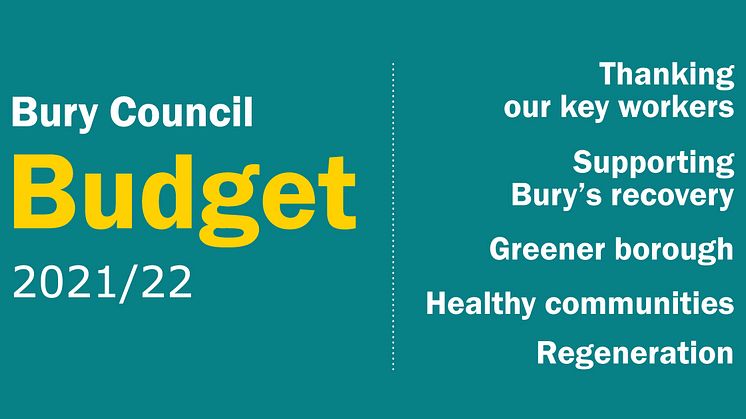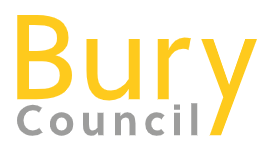
Press release -
Rewarding the lowest paid in a post-Covid budget for recognition, recovery and regeneration
Social care staff who have been at the front line of the coronavirus pandemic are among those to be rewarded by the council’s first post-Covid budget.
Bury is to introduce the Real Living Wage for hundreds of local authority and contracted employees who are currently near the bottom of the pay ladder.
The move, which will cost £1.2 million this year and be phased in over the next two to three years, is a key part of the 2021/22 budget – set by councillors tonight – which focuses on recognition, recovery and regeneration.
Councillor Eamonn O’Brien, leader of Bury Council, said: “Through this pandemic, care staff and those working in schools and a range of other public services have been at the forefront of looking after our elderly and young people. All of them deserve our grateful thanks, but too many of them have been traditionally undervalued and underpaid. I am proud that we are taking the first steps to redress the balance and introduce the Real Living Wage to local authority and agency staff.”
At tonight’s meeting, councillors were told that the Covid pandemic will cost the council £43 million over a three-year period in lost income and increased costs caused by the series of lockdowns and local restrictions.
The authority has bridged a shortfall of £21m in the next financial year (2021/22) by using £11m of reserves, but a further £10m has had to been found by cuts to services.
Cllr O’Brien said: “Covid has had a significant effect on our finances, and will continue to do so for years to come.
“This current year, Covid has cost us £46 million, towards which we have received £36 million in Government help. That still leaves us with £10 million to find, and we estimate that the shortfall will be a further £33 million over the next two years.
“However, it is imperative that we continue to invest in our people and our economy to make sure we can thrive in the post-Covid world.
“Regeneration of our towns is high on our agenda. We have already committed to raising more than £30 million to transform the heart of Radcliffe, and masterplans to regenerate Bury and Prestwich town centres are well under way. We also want to produce a bespoke Town Plan for Ramsbottom and will be looking at how we can protect the future of the civic suite there as part of it.
“We are now committing a further £6 million in a Regeneration Investment Fund to kickstart these projects and attract external investment.
“Our capital programme also includes ongoing work of nearly £10 million to improve our council housing stock.
“And we have announced our commitment to providing free school meals to eligible pupils over the long summer holidays.”
Other measures include:
- A community recovery fund, with £50,000 allocated to each of the five Community Hub areas
- A business recovery fund, supporting ’shop local’ projects and distributed in collaboration with local businesses
- A £200,000 strategic transport fund to take advantage of the Government’s proposed “Levelling Up” initiative
- A £250,000 addition for road safety and street scene improvements, and tackling litter and flooding hot spots
- A £300,000 programme to improve parks and green spaces, plus £100,000 on Burrs Country Park and £150,000 for a new skate park in Clarence Park
- Improvements to play areas worth £200,000
- Anti-poverty measures of £300,000 to help those most in need, including those who have not been eligible for previous support
- Investment in events and local artists during Bury’s year as GM Town of Culture
- £100,000 to upgrade all the borough’s CCTV cameras to high definition, following the rollout of full fibre connectivity.
Cllr O’Brien added: “Our three main themes with this budget are: recognising the tremendous work that people are doing to keep us safe from coronavirus; recovering from the financial impact of the pandemic; and regeneration for our towns across the borough.”
Other budget key points:
- The largest financial cut is in adult social care, provided through the One Commissioning Organisation, which will save £9m over the next four years through a number of service changes and priorities including more emphasis on community care.
Savings of £1.2m will come from children’s services through a review of contracts and the removal of vacant posts.
A further £5m will be found from ‘transformation’ measures including the closure of council buildings and more agile working, self-service and ‘digital first’ measures, and promoting more self-care at neighbourhood level.
- The council voted to increase the council tax by 1.94% for general council services, plus 3% in adult social care precept. Note: all of the adult social care precept will be spent on funding social care for adults.
Levies added by the Greater Manchester Mayor, police and fire services take the total bill increase to 4.69%. More than half of the 84,000 houses in Bury fall into the bottom two bands (A and B), so the increase for them equates to £1.15 a week for a Band A house and £1.34 for a Band B house.
- Council house rents will increase by 1.5%, as will garage rents and sheltered management and amenity charges. Money raised from this can only be spent on social housing.
ENDS
Press release issued: 24 February 2021.
Topics
Categories
Regions
Find us on: Facebook.com/burycouncil, Flickr.com/buryphotos. @burycouncil and bury.gov.uk

